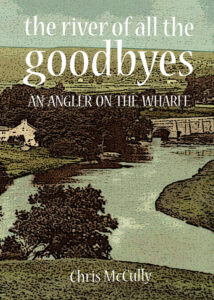If the mystery and sublime beauty portrayed in Chris McCully’s ‘The River of all the Goodbyes: An Angler on the Wharfe’ is to be enjoyed by future generations, writes Andrew Burton — then we must demand change for our neglected waterways.

The River of all the Goodbyes: An Angler on the Wharfe is a love letter to Chris McCully’s native Yorkshire and to the river that flows through its rich and turbulent history. It mixes entomology with etymology, revealing the author’s twin fascinations with word derivations and with the mysterious lives and feeding habits of the fish that populate this most iconic of Yorkshire rivers.
McCully has enjoyed a distinguished academic career from which he retired earlier this year. Alongside his academic research and writing, he has written an impressive selection of angling books which chronicle his passion for messing about on rivers. From 2003 to 2013 he lived in the Netherlands, taught at a number of universities and, of course, fished. Outside (Two Ravens Press, 2011) detailed his experiences of fishing the ubiquitous maren (canals) in the north-eastern part of the Netherlands, predominantly for pike and zander. He returned to the UK in 2013 to take up a professorial post at the University of Essex and this period spawned his book Stour Diaries: Fishing on the Suffolk Stour (The Medlar Press, 2019) in which he delights in becoming intimately acquainted with this river famously immortalised by Constable. But the East Anglian flatlands are not where McCully’s heart lies and it’s clear from the sheer joie de vivre and boyish enthusiasm which bubble up from the pages of The River of all the Goodbyes that in returning to Yorkshire McCully has truly come home.
McCully wears his historical research lightly, illuminating the Wharfe’s cultural history with warmth and acuity. Of all the characters McCully introduces us to, one I found particularly fascinating was Thomas Evan Pritt (1848-95) whose seminal North-Country Flies (1886) was originally printed one year earlier with the more parochial title Yorkshire Trout Flies. But Pritt, it transpires, was not even a Yorkshireman, being a Lancastrian by birth. Moreover, many of the flies he brought to the public’s attention in his popular books were already very well known to his contemporaries, some of these flies — the Winter Brown, for example, or the Little Dark Watchet — being ‘all but identical to those found in John Swarbrick’s 1817 list of Wharfedale flies.’ The distribution of indigenous grayling populations throughout the UK was a real eye-opener for me, too. Almost every page glistens with hidden gems of piscatorial knowledge, entertainingly brought to life.
Amongst the historical research and the lived experience of fishing the river now, McCully intersperses a series of childhood memories which sparkle with dreamlike clarity. His account of catching tommy-ruffe in the early 1970s as the Wharfe ‘meanders sluggishly through Clifton Ings’ is luminous and poignant. Characteristically, this section of the book dives deeply into the origins of the words ruffe and tommy and it set me thinking whether this could be the same fish that I knew as a daddy-ruffe from my own boyhood spent fishing in the English Midlands. I’ll just have to read McCully’s Names of the Fish in British and Irish Freshwaters (The Medlar Press, 2022) to find out.
Around the time I was reading this impeccably produced and beautifully illustrated book, Paul Whitehouse’s TV Series Our Troubled Rivers aired on BBC One and the first river he investigated was none other than the Yorkshire Wharfe. While McCully’s book had set me ruminating on this most sublime of rivers and its cultural history, Whitehouse’s film documented the grim reality of the river’s current state, suffering decades of degradation in the wake of the privatisation of water companies in the late 1980s. In Whitehouse’s film, a campaigner wearing protective gear tentatively submerged himself in the Wharfe near a Yorkshire Water overflow pipe to reveal excessive amounts of waste being deposited directly into the river during storm overflows; wet wipes and sanitary towels swirled in a miasma of human excrement; a less than bucolic picture of the river emerged.
If the mystery and sublime beauty portrayed in McCully’s excellent The River of all the Goodbyes is to be enjoyed by future generations, it behoves all of us who care passionately about Britain’s rivers to make our voices heard and to demand change. Environmental campaigners such as George Monbiot have been doing just that with his recent river Wye campaign, as are Surfers Against Sewage, as has that doughty defender of English chalk-streams, Charles Rangeley-Wilson. Unless we stand up and combat this most pressing of environmental issues, we may all be saying a long goodbye to many of England’s most cherished rivers.
*
‘The River of all the Goodbyes’ is out now, published by Medlar Press.
Andrew Burton is a writer, dramaturg and lecturer. His has recently completed a PhD, re-evaluating the role of naturalism in contemporary eco-theatre.